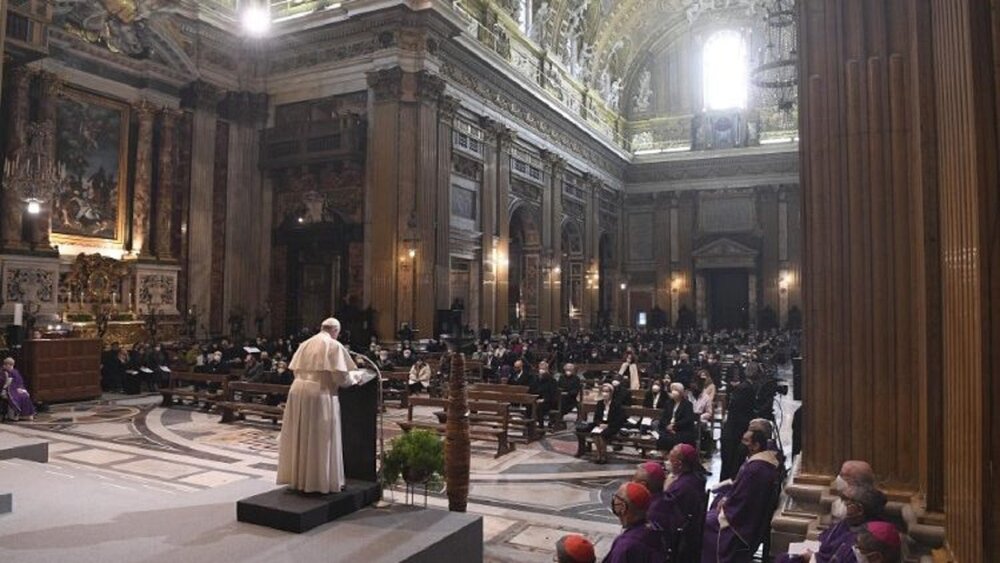Hawzah News Agency – Pope Francis on Saturday travelled to the heart of Rome on Saturday, to the Gesù, the mother church of the Jesuit order in Rome, where he attended Mass and preached on the 400th anniversary of the canonization of the Society’s founder.
St Ignatius of Loyola was canonized on March 12, 1622, along with fellow Jesuit Francis Xavier, Teresa of Avila, St Isidore the Farmer, and St Philip Neri, known as the Second Apostle of Rome.
The Holy Father gave the homily during Mass for the Second Sunday in Lent, reflecting on the Gospel account of the Transfiguration of the Lord. He focused on four actions of Jesus in the Gospel: Jesus “took” His disciples with Him; He “went up” the mountain; He prayed; and He “remained.”
Taking with Him
Jesus, the Pope said, chooses His disciples, including ourselves, and takes us to His holy mountain to be transfigured by His love. The Holy Father noted that Jesus took the disciples as a community, showing to us that we are a part of the Church, and calling us to form and foster communion.
Pope Francis noted that the saints whose anniversary we celebrate today were “pillars of communion,” and invite all of us to “cherish the beauty of having been ‘taken,’ brought together, by Jesus.
Going up
The second verb, the Pope said, is “to go up.” Jesus’ path, he said, “is one of ascent, not descent”; it is not an easy path, but a difficult journey. This means going to extremes, to the ends of the earth, and not remaining static.
For Jesus’ disciples, said Pope Francis, “now is not a time for sleeping, for letting our souls be sedated, anesthetized by today’s consumerist and individualistic culture.” Instead, as we learn from St Teresa of Avila, we are called to go beyond ourselves, to realize that God reveals Himself through the struggles of our brothers and sisters.
Praying
Pope Francis noted that the Transfiguration was an experience born of prayer: Jesus went up the mountain to pray. Today, he said, we can ask ourselves about our own prayer life. Do we pray simply out of force of habit? Or do we recognise that prayer truly changes the world. “To pray is to change reality,” the Pope said. It is “an active mission, a constant intercession… [prayer is] not distant from the world, but changes the world.”
The Holy Father invited us to ask ourselves, “Does prayer immerse us in this change? Does it transfigure our situations?” Prayer, he said, “reignites the fire of mission, rekindles our joy” and inspires us to be “troubled” for those who suffer.
In particular, he said, “Let us also ask ourselves how we are bringing the present war to our prayers.”
He then pointed to the example of Philip Neri, whose prayer inspired him to help the children of Rome; or of St Isidore, who brought his farm work to prayer.
To remain
Summing up the first three actions of Jesus, the Pope said that, “Taking up each day anew our individual calling and our community history; then going up towards the heights that God points out to us; and praying in order to change this world in which we are immersed.”
However, he said, there is also a fourth verb in the day’s Gospel: to remain. At the end of the Transfiguration, the Pope said, Jesus remained. In this day and age, he said, we often focus on secondary things, on what is passing, forgetting what remains. In the Transfiguration, though, the witness of God recalls what is essential. “How important it is,” the Pope said, “for us to work on our hearts, so that they can distinguish between the things of God that remain, and worldly things that pass away!”
He concluded his homily with the prayer that St Ignatius might help us preserve discernment as an ever-timely treasure for the church and world – a treasure that allows us to see anew all things in Christ.
Thanksgiving for the Saints
At the conclusion of the Mass – which was celebrated by the Superior General of the Society of Jesus, Fr Arturo Sosa – a brief ceremony took place in the chapel of St Ignatius. In the presence of relics of the five saints whose anniversary was being celebrated, the leaders of their communities thanked God for the gift of their sanctity.
The service concluded with the prayer:
O Lord, in your saints Isidore the Farmer, Ignatius of Loyola,
Francis Xavier, Teresa of Jesus, and Philip Neri,
grant us the courage of the humble,
the boldness of those who trust,
the simplicity of the poor in spirit,
and the passion of soldiers who are disarmed,
that we may allow you to triumph
and to guide your Church and the world
to a new Pentecost of grace and peace, of communion.
In these times of pandemic, of war,
but also of hope, make us saints,
as you wish and desire.
May your holy will be done, always and in each of us.


Your Comment